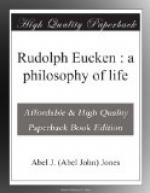Moreover, man does not become aware of the depth of his own soul, until he has “lived into” the experience of the past. This is what the profound investigator of history does; he lives again the life of the hero, he feels with him as he felt upon special occasions, and in this way there is revealed to him a profundity and greatness of human experience, of which he would have been largely unaware if he had trusted to his own experience alone, and to the superficial examination he is able to make of the experiences of those living men with whom he comes into contact. In this way he is able in a sense to appropriate the experience of the greatest personalities unto himself, and enrich considerably the contents of his own soul.
Through a study of history, too, we become aware of the intimate connection that exists between the present and the past. The present moment is a very transient thing; its roots are in the past, its hopes in the future. “If all depends on the slender thread of the fleeting moment of the present, which illumines and endures merely for a twinkling of an eye, but to sink into the abyss of nothingness, then all life would mean a mere exit into death.... Without connection there is no content of life.” We are apt to look on the past as something dead, but it exists in living evidence in our souls to-day. It oppresses us or stimulates us to action, it tyrannises over us or inspires us to higher things. It has been customary to look upon the past as irrevocable. Recent writers, of whom Maeterlinck and Eucken are striking instances, have endeavoured to show how the past can be remoulded and changed. The past depends upon what we make of it to-day; if we despise our evil conduct in former days, then the past itself is changed and conquered. The mistake that is made is to regard the past as a thing complete in itself; what appears to be finished is really only completing itself, and we must take a view of the whole of a thing, and not merely the parts that have already manifested themselves. Through such considerations we become more and more aware of the ultimate connection between the past and present, and of the part the present can play in the remaking of the past.
Our investigations of history leads us, too, to differentiate between the temporary and the eternal in the realm of thought. We find at a certain period of history a trend of thought that can largely be accounted for by the special conditions of life at the time, and which disappears at a later age. But in addition to this we become aware of truths that have found a place in the thoughts of various ages and countries, and we are led to regard these as the eternal truths—expressions of an eternal ever-present reality. This eternal present we find to be something independent of time, something that breaks the barriers between the past, present, and future. “Thought,” says Eucken, “does not drift along with time; as certainly as it strives to attain truth it must rise above time, and its treatment must be timeless.” The beliefs of any age are too much coloured by the special circumstances of that age to express the whole of truth, yet beneath the beliefs of the ages there is often an underlying truth, and this underlying truth is the eternal truth, which is not affected by time, and at the basis of which is the eternal reality.




